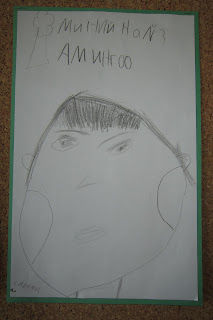"It is a happy talent to know how to play."
Ralph Waldo Emerson
"I don't want my child just playing all the time, I want her to be learning" was feedback I received at the beginning of the school year from one mother who sends her 5 year old child to our after school care program . For this mother learning looks like her child sitting at a desk, copying letters and numbers into a book and bringing it home at the end of the day for her to see. Hearing comments like this one make me realise that I must be an advocate for children and their play on every level- not just in training teachers, but also educating parents. Mongolia's education system talks of play, but does not provide time and space for it. Even in many kindergartens (preschools) children as young as 2 years old are sitting at tables and doing "lessons".
I assured this mother that her child would indeed be learning, and that the majority of it would be through her play. We spend some time learning about the Mongolian alphabet and letters- again, not by copying letters in a book but through hands on learning experiences, explorations, art, singing, making and playing. The rest of our time is spent in earnest play. The school-aged children have set homework that they need to complete for their teachers, but once that is done they get down to the business of play and exploration. There is limited opportunity for it at kindergarten, and NONE at school, so there is much need to "catch-up" on play at our after school care program.
"There is for many a
poverty of play." D.W. Winnicott
This quote sums up my feelings as I look around at Mongolian schools and early childhood settings. It makes me all the more determined to create in our NGO (and eventually our Kindergarten) a model for change in the way that education happens here in Mongolia. And within that model you can be sure that there will be a whole lot of play...
"The creation of
something new is not accomplished by the intellect but by the play instinct."
Carl Jung
"Close observation of children at play suggests that
they find out about the world in the same way as scientists find out about new
phenonoma and test new ideas…during this exploration, all the senses are used
to observe and draw conclusions about objects and events through simple, if
crude, scientific investigations."
Judith Roden
Watching children play is a marvelous thing. On a particular day, as I move around the room, I see Enhjin and Solongoo playing the "Hungry Caterpillar" card game, but using rules they have negotiated and created themselves (I don't actually know the original rules of the game, so the children are always making up new ones, and finding new ways to play!)
I see Huslen and Saara creating patterns and lines and order as they sort through and play with some coloured foam blocks.
I find an insect army preparing for battle...
And the caterpillars are guarding the fort!
The bunny is being well cared for, and a sweet little home is being built around it.
Mathematical skills are being honed with the use of small coloured cubes and some prompt cards...
So much learning is taking place, and so much of it is not planned by anyone but the children themselves. Yes, as the teacher I set up the environment, I provide materials and resources, but most of the play and learning seen here is self-selected and self-directed.
"Play is the highest form of research."
Albert Einstein
Play fosters
belonging and encourages cooperation.
Stuart Brown
“Men should learn to live with the same seriousness
with which children play.”
Nietzsche
“Play is the highest expression of human development
in childhood, for it alone is the free expression of what is in a child’s
soul.”
Friedrich Froebel
The children have recently been exploring an interest of restaurants. Below is one expression of this exploration, with the use of lego. I love that even the headless lego people get to come to the restaurant too... everyone has to eat! J
Ultimate gaming! Who needs technology when they have imagination, a tray and an old keyboard? J
Connecting with culture: Below, Sainaa and Itgel are playing a traditional Mongolian game using the ankle bones of sheep. Play provides a space for children to learn, experience and connect with their own culture.
So as my friend Jenny would say: Let the children play!
































